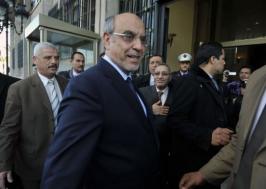
AFP — Tunisia was scrambling to find a replacement premier on Thursday and pull itself out of a major political crisis two days after Hamadi Jebali quit over his failure to form a cabinet of technocrats.
The consultative council of Ennahda was meeting to choose a successor to Jebali, the ruling Islamist party’s number two, who ruled himself out after suggestions that he might be reappointed.
Jebali resigned on Tuesday after his plan to form a non-partisan government, announced in the wake of public outrage over the assassination of leftist politician and Islamist critic Chokri Belaid, was rejected by his own party.
Interior Minister Ali Larayedh told reporters there had been arrests in the murder inquiry, but did not say how many.
“The investigation has not led yet to identify the killer, those behind the murder and its motives,” he said.
Belaid’s killing plunged Tunisia into its worst political crisis since the 2011 uprising that toppled dictator Zine El Abidine Ben Ali, enflaming political tensions and laying bare Ennahda’s divisions between moderates and hardliners.
The party’s executive arm was meeting to consider four candidates as possible successors to Jebali, spokesman Nejib Gharbi was quoted as saying by the official TAP news agency.
“Nothing has been decided yet, but there are four candidates for the post of prime minister — Ali Larayedh (the interior minister), Mohamed Ben Salem (agriculture), Noureddine Bhiri (justice) and Abdellatif Mekki (health).”
The party later said Jebali, who is considered a moderate, had turned down an offer to head the new government, after senior Ennahda members, including its leader Rached Ghannouchi, said the party was seeking to reappoint him.
“Ennahda announced that Hamadi Jebali has declined to accept its offer to be the party’s candidate for the post of prime minister,” Ennahda said, while continuing to refer to Jebali as its secretary general.
The party said it was “in the process of pursuing consultations internally and with its partners to present the president of the republic with the name of a successor to Jebali before the end of the week.”
In a televised farewell speech on Thursday evening, Jebali repeated that his proposal was the best way forward, while reaffirming his decision not to accept a new appointment with “no prospect for success.”
He spread wide the blame for its failure, accusing not only coalition and opposition parties, but also the unions, business community and the media, which he said never stopped “throwing fuel on the fire.”
The presidency said on Wednesday the Islamists were entitled to choose the new premier because they have the most seats in the national assembly.
Belaid’s assassination, by a gunman outside his home, did little to ease the political misgivings of liberals and secularists, who believe Ennahda is failing to rein in religious extremists threatening stability.
Belaid’s family accused the Ennahda of orchestrating his murder, a charge it strongly denied.
The killing also sparked deadly street protests and strikes, which Jebali attempted to defuse by announcing plans for a non-partisan cabinet of technocrats to lead Tunisia into early elections.
Failure to form a new government comes amid deadlock over the drafting of a constitution, with parliament divided over the nature of Tunisia’s future political system 15 months after it was elected and more than two years after the revolution.
But Jebali’s proposal quickly foundered, and the premier received a final rebuff by his own party on Monday, prompting him to carry out his threat the next day to resign if he failed to win sufficient support.
Jebali’s plans, while largely supported by the opposition, had been bitterly opposed by Ennahda hardliners, represented by Ghannouchi, who refused to give up key portfolios and who insist on Ennahda’s electoral legitimacy.
The Islamists control the interior and foreign ministries and dominate the national assembly.
Since the revolution, Tunisia has also been rocked by violence blamed on radical Salafists, and ongoing social unrest over the government’s failure to improve poor living conditions.
On Thursday, medics said two policemen were wounded in a firefight with presumed Salafists they had cornered in a mosque in Sidi Bouzid, cradle of the uprising that ousted Ben Ali. An official said only one was hurt.